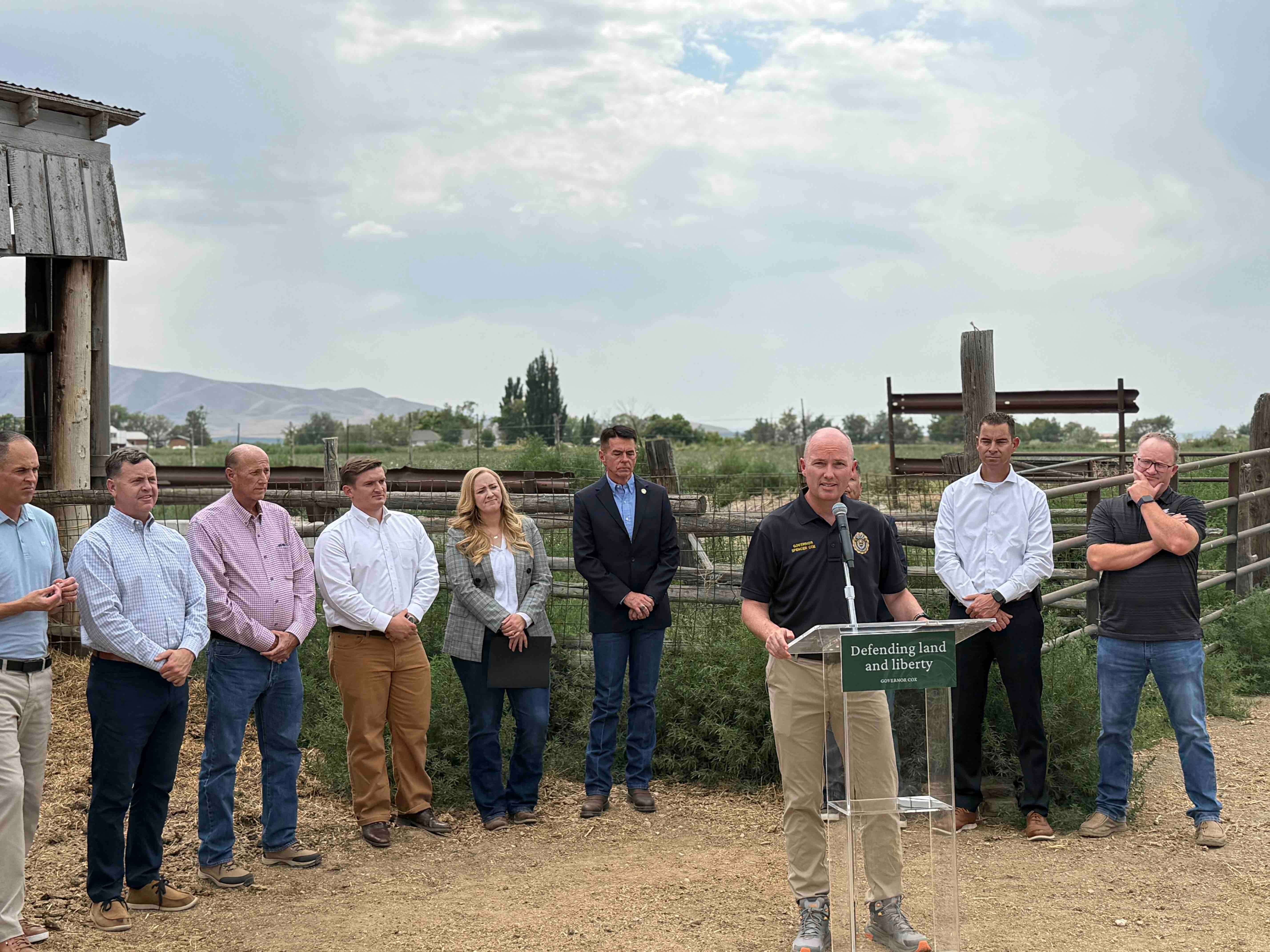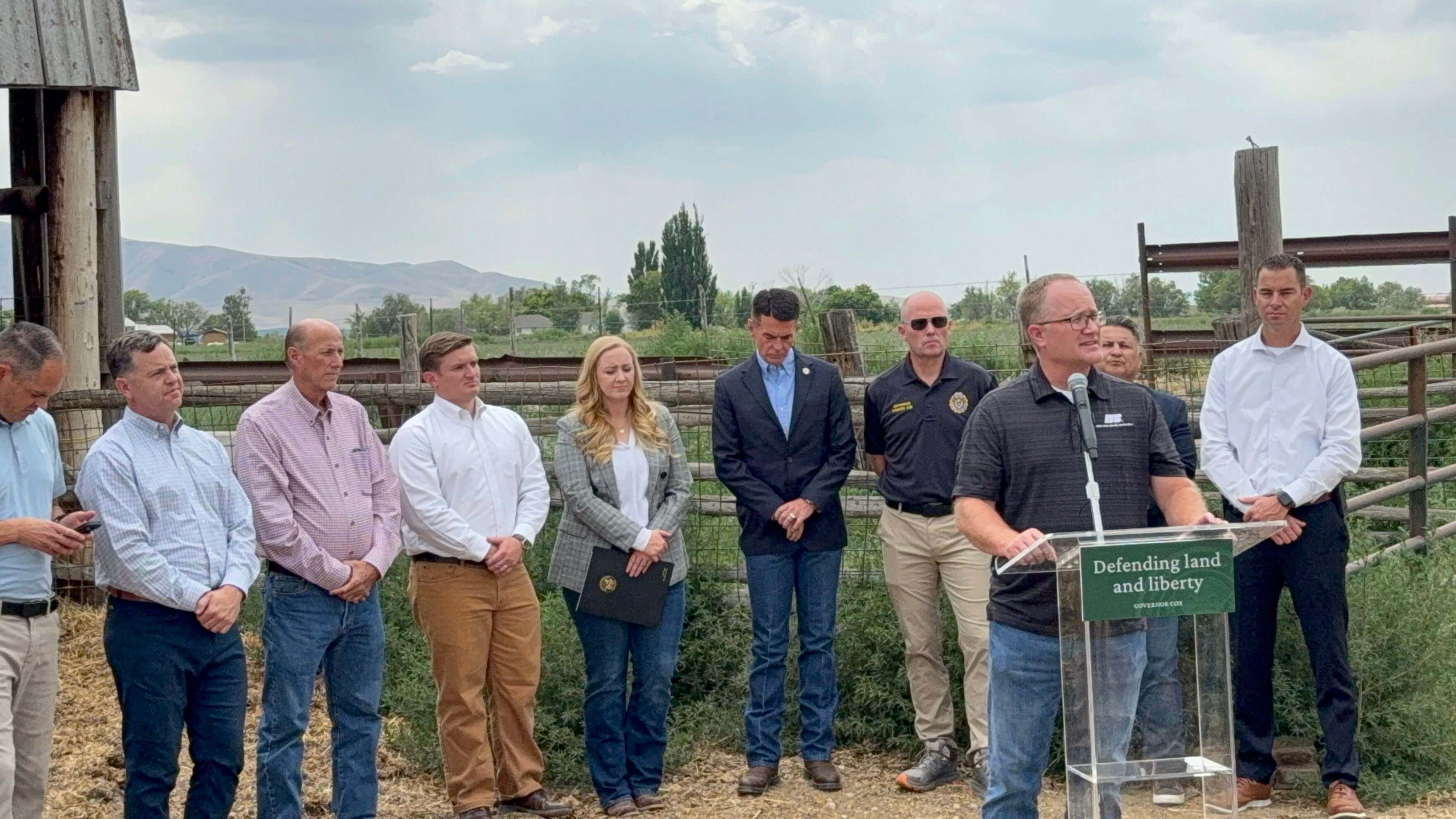Utah Governor Blocks Land Sale to Chinese Entity
Author
Published
7/16/2025
Utah Farm Bureau CEO Spencer Gibbons participated in a press conference with Utah Governor Spencer Cox on efforts to safeguard Utah’s land and strategic interests from foreign influence that could undermine state and national security.
Held on the fifth-generation family farm Susan Sorensen in Palmyra, Utah County (near Spanish Fork), Governor Cox announced that state officials had successfully blocked an attempted land purchase near Provo Airport by Cirrus Aircraft, a company majority-owned by the Aviation Industry Corporation of China (AVIC). AVIC is a Chinese state-owned defense contractor prohibited from acquiring Utah land under state law.
“This isn’t just about one deal. It’s about protecting strategic land and ensuring foreign adversaries cannot gain a foothold in our state,” said Gov. Cox. “Other states might have let this slip through the cracks. Utah didn’t, and won’t.”

Foreign investment in U.S. agricultural land has become a hot topic, largely spurred by media reports raising concerns about bad actors from adversarial nations purchasing land for potentially hostile purposes.
“Limiting foreign ownership is part of ensuring our food supply is secure – food security is national security. We want to ensure that any steps by USDA or by the State of Utah protect Utah agriculture,” said Spencer Gibbons, Chief Executive Officer of the Utah Farm Bureau Federation. “We also value private property rights. Utah’s farmers should have the freedom to sell, lease, or invest in their land based on their individual needs. But that freedom should not come at the cost of transparency or national security. The bottom line is this: Utah’s agriculture sector welcomes investment, but it must be done responsibly and transparently. We appreciate the leadership from Governor Cox on this issue, and we stand with him in protecting both our land and our future.”
Several questions arise when considering this issue, including how much agricultural land in the U.S. is owned by foreign investors and from what countries do those investors hail, what kind of land do these foreign entities own, and how have these numbers changed in recent years. While data exists to answer many of these questions, the quality of these data points has often been questioned, complicating our true understanding of how much U.S. ag land investors own U.S. ag land and who they are.
This issue can also impact private property rights, agricultural research, and innovation. Farmers and ranchers strongly support the freedom for farmers to develop, invest in, or sell land depending on their independent needs, while respecting national security.
Rep. Candice Pierucci, who sponsored the original legislation, also spoke at the press conference on efforts to safeguard American institutions and assets.
“Utah has led the way in safeguarding our land and military assets. We were one of the first states to ban the Chinese Communist Party from owning land here,” said Rep. Pierucci. “The work we’ve done not only advances Utah’s interests but also sets a national example for how states can push back against the CCP’s malign influence and protect our security. National security is no longer the exclusive domain of Washington—it begins here at home, on our farms, in our schools and universities, across industry, and with state and local policymakers.”
Many of the current concerns about foreign ownership of U.S. ag land have focused on China. According to the latest AFIDA data, China is ranked 18th in the ownership of U.S. ag land with 383,000 acres, less than 1% of total foreign-owned U.S. ag land, or just three hundredths of one percent of all agricultural land in the U.S.
According to USDA and American Farm Bureau data as of Dec. 31, 2023, about 34,000 acres in Utah had been owned by Chinese companies and investors, which mostly consisted of land owned next by a U.S. pork processing company that was acquired by a Chinese-owned firm in 2013. In recent months, most of that land has been sold to a local land-management organization headed by Matt Garff.
While foreign ownership of U.S. agricultural land is still relatively low—about 3 percent overall—we know the concern isn’t just about how much land is owned, but who owns it and where.
Gibbons explained that current data collection and reporting on foreign ownership of U.S. agricultural land is flawed and needs be improved to enable informed policymaking.

“Right now, the federal government’s data on foreign ownership is incomplete. We need better reporting and enforcement tools to truly understand what’s happening on the ground,” Gibbons said. “That’s why we support the bipartisan AFIDA Improvements Act and the Promoting Agriculture Safeguards and Security (PASS) Act. These bills would bring needed clarity to foreign land ownership and give the U.S. Department of Agriculture a formal role in national security reviews. We’re also encouraged by recent steps taken by the USDA to strengthen agriculture security and supply chain resilience. Adding the Agriculture Secretary to the committee that oversees foreign investment is a smart move.”
Foreign investment in U.S. agricultural land has garnered significant attention due to concerns about purchases by adversarial nations and individuals. That is why a newly released initiative from USDA focuses on agriculture as a key component of protecting national security.
The seven-part plan addresses agriculture security, and includes limiting ownership of American farmland by adversaries of the United States. It also involves enhancing supply chain resilience and safeguarding both plant and animal health. Perhaps most importantly, the Agriculture Secretary has been added to the Committee on Foreign Investment in the United States (CFIUS).
Rep. Pierucci also announced that Utahns could expect to see legislation in the upcoming legislative session addressing vulnerabilities to foreign influence over Utah’s water infrastructure and the forced disclosure of critical minerals when ranchers sell products to China, according to Deseret News reports.
Want more news on this topic? Farm Bureau members may subscribe for a free email news service, featuring the farm and rural topics that interest them most!
